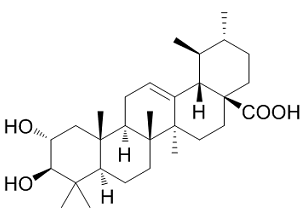
Corosolic acid is a pentacyclic triterpene acid found in Lagerstroemia speciosa, has antidiabetic, anti-inflammatory, antiproliferative, and protein kinase C inhibition activity. Corosolic acid displayed antagonistic activity against the phorbol ester-induced morphological modification of K-562 leukemic cells. Corosolic acid induced apoptosis in CT-26 cells, mediated by the activation of caspase-3. It inhibited the proliferation and tube formation of human umbilical vein endothelial cells and human dermal lymphatic microvascular endothelial cells, decreased the proliferation and migration of human umbilical vein endothelial cells stimulated by angiopoietin-1.
In vivo, A mouse colon carcinoma CT-26 animal model was employed to determine the in vivo anti-angiogenic and anti-lymphangiogenic effects of corosolic acid.
| Molecular Weight | 472.7 |
| Formula | C30H48O4 |
| CAS Number | 4547-24-4 |
| Solubility (25°C) | DMSO: 10 mM |
| Storage |
Powder -20°C 3 years ; 4°C 2 years In solvent -80°C 6 months ; -20°C 1 month |
| Species | Mouse | Rat | Rabbit | Guinea pig | Hamster | Dog |
| Weight (kg) | 0.02 | 0.15 | 1.8 | 0.4 | 0.08 | 10 |
| Body Surface Area (m2) | 0.007 | 0.025 | 0.15 | 0.05 | 0.02 | 0.5 |
| Km factor | 3 | 6 | 12 | 8 | 5 | 20 |
| Animal A (mg/kg) = Animal B (mg/kg) multiplied by | Animal B Km |
| Animal A Km |
For example, to modify the dose of Compound A used for a mouse (20 mg/kg) to a dose based on the BSA for a rat, multiply 20 mg/kg by the Km factor for a mouse and then divide by the Km factor for a rat. This calculation results in a rat equivalent dose for Compound A of 10 mg/kg.
| Related Autophagy Products |
|---|
| Sofalcone
Sofalcone is a gastric antiulcer agent, it is known to induce the expression of Heme oxygenase-1 (HO-1) in gastric epithelium. |
| P62-mediated mitophagy inducer
P62-mediated mitophagy inducer (PMI) is a P62-mediated mitophagy activator. P62-mediated mitophagy inducer activates mitochondrial autophagy without recruitment of Parkin or collapse of the mitochondrial membrane potential and remains active in cells lacking a fully functional PINK1/Parkin pathway. |
| FDW028
FDW028 is a potent and highly selective FUT8 inhibitor. FDW028 exhibits potent anti-tumor activity by defucosylation and impelling lysosomal degradation of B7-H3 through the CMA pathway. |
| Calmodulin-Dependent Protein Kinase II (290-309)
Calmodulin-Dependent Protein Kinase II (290-309) is a potent CaMK antagonist with an IC50 of 52 nM for inhibition of Ca2+/calmodulin-dependent protein kinase II. |
| Microcolin H
Microcolin H is a marine lipopeptide and phosphatidylinositol transfer protein ligand that targets PITPα/β. |


Products are for research use only. Not for human use. We do not sell to patients.
© Copyright 2010-2023 AbMole BioScience. All Rights Reserved.
